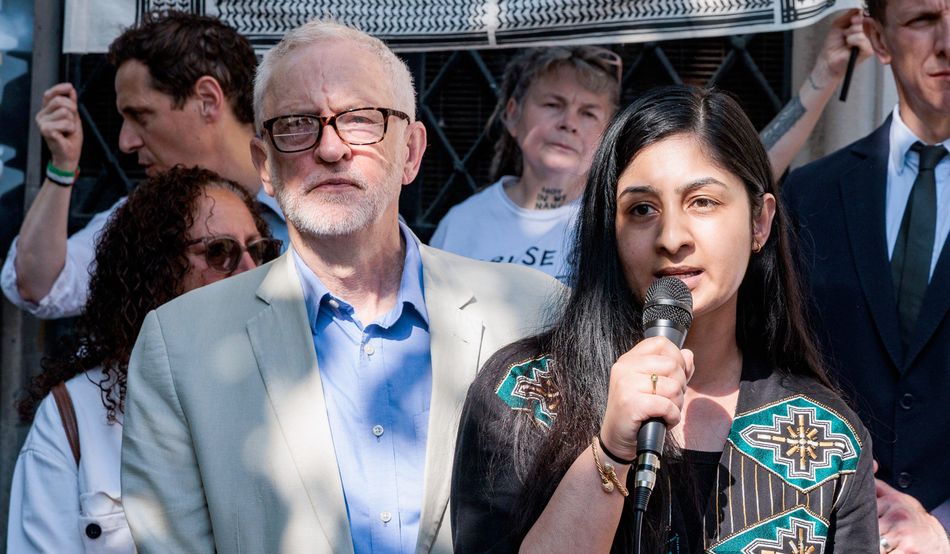A spectre is haunting Keir Starmer’s Labour. Just as the prime minister and his chief of staff, Morgan McSweeney, thought they had banished the ghost of Corbynism, a new wave of “left populism” has started to sweep through the party and, indeed, through rival parties of the left. This is not just happening in the United Kingdom. Worldwide, left populism is having a moment.
Its lodestar is Zohran Mamdani, winner of the Democratic party primary to New York City’s mayoral race. Mamdani might be leftist royalty—his father is the famous (at least to academics like me) Columbia professor Mahmood Mamdani—but his victory was a huge surprise, vanquishing traditional political royalty in his rival, the former New York governor Andrew Cuomo.
Mamdani’s success has spooked some of New York’s wealthiest residents because, rarely for an American politician, he earned his win with a seriously interventionist policy programme. He promised big-ticket spending plans, such as free buses, city-owned grocery stores and an expansion in affordable housing, which would be paid for by higher taxes on high earners. Mamdani has proposed a 2 per cent income tax on the wealthiest 1 per cent of New Yorkers and an increase in corporate tax.
Taxing wealth to pay for free public transport is not the only left populist part of Mamdani’s campaign. He is far less timid on Gaza, immigration and Donald Trump than most Washington-based Democrats. But Mamdani has charisma—that thing which so eludes Starmer—and is unafraid to go after elites in his own party and city. And he did so with viral videos appealing to the average New Yorker: running into the chilly sea off Coney Island; complaining about the price of street food.
Starmer could follow Mamdani’s lead, filming TikToks at kebab vans, making a show of taxing the rich and throwing money at housing and transport, nationalising Tesco. If the prime minister were able to pull it off, and that’s a big if, would such politics lead Labour to victory in the next election?
Whatever the right-wing press might say, “left” and “populist” are not the terms that immediately come to mind when describing Starmer’s Labour. The prime minister might make the occasional rhetorical gesture towards the types of socialist traditions associated with his namesake, Labour founder Keir Hardie, but he has largely governed from the right of the party. Together with Rachel Reeves, and under the strategic direction of McSweeney, Starmer has emphasised fiscal rectitude, scepticism about migration, and a warm transatlantic relationship with a controversial Republican president. If you were to plot him on Labour’s left-right axis, Starmer would be Tony Blair but with a pronounced distaste for Deliveroo drivers.
Taking a broader, cross-party view of what it means to be “on the political left”, however, Starmer might just about qualify. Where I think we will all agree is that he is no populist. I have a professional political scientist’s ingrained nervousness about defining “populism”. The term refers both to something rhetorical—the contrasting of a pure “people” with a corrupt “elite”—and to something behavioural, which is running roughshod over existing institutions and norms with a claim to manifesting the will of the people. A single definition rarely satisfies either academic reviewers or below-the-line commenters. Still, like an inverse of Justice Potter Stewart’s famous definition of pornography, “I know it when I see it”, with Starmer, I know that I don’t see it.
The threats to Starmer’s ascendancy appear to be coming from a “left” or a “populist” direction, and sometimes both at once. From the left, within the Labour party and without, there are concerns about Labour’s record on poverty, its aggressive language on immigration and its apparent meekness on the Gaza conflict. Several Labour MPs have already lost the whip and voices in Number 10 seem to have been toying with “decimating” the ranks pour encourager les autres.
Outside of the party, the Greens have tilted in a more left-leaning direction, and one-time Labour MPs Jeremy Corbyn and Zarah Sultana have formed an as-yet unnamed, though presumably Corbynite, party. Labour has been bleeding voters to the left, perhaps indeed to left populists, since last year’s election.
Despite these real challenges, it is the populist threat from the right rather than the left that seems to have spooked Number 10. The rise of Reform UK in the polls appears sustained, and even to hint at the possibility of a Reform majority in 2029. Labour’s increasingly aggressive language about migrant rights and public order, combined with what looks like barely concealed glee at the tribulations of universities, suggest that McSweeney and company really do think Nigel Farage is their most likely competitor. Reform’s rise is also, of course, an existential threat to the Conservatives, who have responded by accelerating past Reform in their attacks on immigration and near-fetishistic use of the phrase “white British”.
As it stands, either force could derail Labour. In YouGov’s latest polling, the party has lost around 10 per cent of its 2024 vote to the Greens and Reform each. So, it might prove better to join them than to be beaten by them. In theory, Starmer could adopt the trappings of both sets of opponents and shift in a left populist direction.
Doing so would be a “back to the future” strategy. Before Starmer’s ascendancy, the party had pushed ever more to the left, and oftentimes even to populism. It feels like a lost era now, but Ed Miliband as leader broke with New Labour’s pro-market impulses, trying to shift the party towards its (then still healthy) European social democratic peers. And there were ghosts of populism future in the infamous “controls on immigration” mugs hauled out for Labour’s 2015 campaign.
British politics did move to the left after 2019—under that inveterate shapeshifter, Boris Johnson
Still, we rightly remember the Corbyn era as the peak of Labour’s left populism. Miliband’s economic offer in 2015 was fairly milquetoast—David Axelrod famously described it as “vote Labour, win a microwave”. There would be no such microwave-minimalism under Jeremy Corbyn.
Corbyn was no one’s idea of an establishment elite, despite his long career in politics, and his rhetoric and manifesto promises were both ambitiously redistributive and explicitly “for the many not the few”. While he was more focused on policy for the masses—be it ending austerity or free broadband for all—Corbyn’s rhetorical barbs were often targeted directly at a “cosy club”, a “gilded elite” in charge of a “rigged system”.
The tragedy for Corbyn is that British politics did indeed move to the left after 2019, despite the Conservatives’ success in that year’s election, and it certainly became more populist. It just did so under that inveterate shapeshifter, Boris Johnson. The language of left-behind Britain and “levelling up”, the increase in general taxation to pay for “our” NHS and social care, the expansion of immigration to fill healthcare slots, combined with incessant anti-European tub-thumping. From a dry, Thatcherite perspective, all this might have smacked rather dangerously of left populism.
Now that we have an actual Labour government, however, we seem to have been sucked back into hesitant fiscal discipline and nervous second-guessing. The imposition of VAT on private schools (see Ros Taylor, p18), inheritance taxes on family farms and cutting back the non-dom tax regime are about as far as Starmer’s Labour has been willing to lean towards left populism. These rather marginal, techie policies had floated around the Treasury and even conservative thinktanks for a decade. Johnson might have found them rather picayune, compared to, say, bold policy such as the furlough scheme.
In terms of big picture leftist ideas, Labour has been almost silent. Self-imposed restrictions on raising income tax, employee national insurance and VAT; the politically disastrous roll-back on the Winter Fuel Payment; the reluctance to end the two-child benefit cap or reform social care. Labour has created a policy desert and called it peace.
The peace will not hold past this autumn’s budget. Reeves may have to find more than £40bn in revenues, according to the National Institute of Economic and Social Research, as she tries to quell backbench demands to remove the two-child cap. All while trying to secure the improvements in public services that seem the most likely path to victory at the next election.
Enter left populism? While Reeves has tried to tamp down on talk about a wealth tax, the fact that the idea keeps appearing on newspaper front pages suggests her attempts to do so have not been entirely successful.
Wealth taxes were once the great hope for progressives worldwide. Just over five years ago, before Joe Biden’s unexpected rise in the primary for the Democratic presidential nominee, it looked like a two-horse race between the progressive senators Elizabeth Warren and Bernie Sanders. Both advocated a progressive tax on the net wealth of Americans with more than $50m in assets, rising sharply for those with more than $1bn. Their taxes would have sliced by more than half the combined one trillion dollars owned by America’s richest 15 people.
This should have been an easy win come election time; there are more than 150m American voters and far fewer US billionaires. And yet. Campaign contributions still drive American politics, with just 100 families donating $2.6bn at the 2024 presidential election, 30 per cent of which went to the Democrats. Even under Biden, a Democratic president, no wealth tax emerged. Said billionaires are wealthier now than ever. Wealth taxes might seem like a political no-brainer; they can clearly also be a no-goer.
British billionaires are less rich and more mobile than their American counterparts. Perhaps they could lobby less effectively against a wealth tax. In any case, extremely wealthy people, with extremely well-paid accountants, are extremely good at avoiding such taxes. That means that a wealth tax on billionaires might get some good headlines and public support, but whether it can cover Reeves’s £40bn hole is less certain. In my own research, I find net wealth taxes on “the wealthiest in society” are popular, but not overwhelmingly so. Just under 60 per cent of British voters support them.
Labour could try to trap easier prey, such as the great British homeowner. Wealth in the UK is now six times national income, up from four times in 1997, mostly due to the boom in house prices. Overall wealth taxation, meanwhile, remains a stagnant 3 per cent of GDP. Property taxation in the UK is far less progressive than in the US, where homeowners pay some percentage of the current valuation of their house in local taxes. We prefer the halcyon age of 1991 property prices to anchor our council taxes, and to have a top band that is usually merely three times the tax due on the lowest band. If only house prices themselves were so constrained.
An ambitious left populist Labour government might go for council tax revaluation or a land value tax. That would mean taking on homeowners. But Labour has already touched the “third rail” of British politics by advocating building on the Green Belt, so perhaps the UK’s fiercest lobby group—people worried about their house value—are less fearsome than imagined. Recent chat about applying inheritance taxes to gifts (hitherto exempt) suggests that Labour is at least wealth-tax-curious.
Still, the party might need to pair that curiosity with caution. My own surveys of the British public find that they like the idea of a potential wealth tax on the very richest people, but actually existing wealth taxes—including inheritance taxes, stamp duty and taxes on savings—are the ones they find most unfair, even if relatively few people pay them. By contrast, those big-ticket taxes that hit everyone—income tax, national insurance and VAT—are viewed as the fairest.
Starmer’s problem is that those are the very taxes Labour pledged not to raise. Perhaps the party should have been less reticent to do so. A left populist spending programme, which could win it the next election, needs higher taxes—including from average earners, who have been the big winners of tax cuts over the past few decades.
When people talk about Britons wanting a European welfare state with American taxes, they sometimes forget that both the UK and the US have quite progressive income taxes, where the marginal rate of tax rises as a person’s income increases. To have a big welfare state, everyone, including modest earners, needs to pitch in, as they do in Scandinavia. Labour is visibly constrained by that pledge; it might fare better by dropping it. Not least because raising income tax or VAT might be substantially more popular than Labour strategists think.
Let’s say Labour does, in our brave new left populist world, raise income tax. What to spend the money on? Mamdani’s free buses, city-owned supermarkets and affordable housing are ambitious for municipal politics but rather less for a government in charge of a G7 economy. Starmer has many more levers to pull.
So far, the debate in the Labour party has been about how much more to spend on directly reducing poverty. That means ending the two-child limit on welfare benefits, resisting cuts to disability payments and reviving Sure Start in deprived areas. Directly improving the lives of the poor is the moral imperative of most in the party and the fight has been over how much to spend, not on whom.
A populist cannot quake in fear at a day of bad tabloid headlines
But there is a wrinkle here, in the so-called “paradox of redistribution”. Developed by the sociologists Walter Korpi and Joakim Palme, the paradox is that welfare states that target all their spending on the poor end up redistributing less wealth and being less good at reducing inequality than those that spread their spending more wisely. So, if your goal is a more equal society, you want universal, not means-tested, benefits.
A left populist agenda might aim at more indiscriminate spending, without worrying about exactly who gains from the state’s generosity. This was an undercurrent of Corbyn and John McDonnell’s 2019 Labour manifesto, which had lots of universal spending promises that weren’t limited only to poorer Britons—including on broadband, higher education and transportation. Of course, that means much higher taxes, something that Corbyn’s Labour was perfectly happy to contemplate.
Those higher taxes resolve some of the “paradox of redistribution”. To pay for universal benefits you need to tax everyone more, including the rich. As is seen in countries such as Sweden and Denmark, that compresses disposable income. But there is a further benefit of universalism, which is that it helps generate middle-class buy-in to the welfare state. Middle-class people vote more, complain more at council meetings and buy more newspapers. They matter politically. If they get goodies from the state too, they may be happier to protect it through higher taxation. That’s how a left populism can win widespread support.
People advocating (or decrying) left populism tend to focus on the “left” part. That frightens them, because it threatens the wealth they have accrued individually. But populism is more than taxes and spending. It is a style of speech and a preference for action over contemplation. What does a leftist version of that look like?
Sometimes it is iconoclastic: the comedian Beppe Grillo’s trolling style leading the (sort of) left and (definitely) populist Five-Star Movement in Italy. Sometimes, as with Corbyn or Bernie Sanders, it is deadly earnest. Sometimes it is angry patricians turning on their fellow elites, as with Franklin Delano Roosevelt, whose immortal put-down to his wealthy detractors was that “they are unanimous in their hate for me—and I welcome their hatred”.
There are many ways of speaking like a left populist, but they require authenticity and courage. A populist cannot quake in fear at a day of bad tabloid headlines. They must be willing to identify, mock and challenge enemies (who are crucial to any populist’s success).
While this type of rhetoric might not seem natural to Starmer, he does have plenty of enemies with plenty of weaknesses. He could go hard after the Conservatives’ new dalliance with ethnocentric politics and their soft underbelly when called out on it—as with pretender to the Tory throne Robert Jenrick’s apparent shock at being termed xenophobic on Radio 4’s Thought for the Day. He could turn his rhetorical guns on Farage’s dubious past views on Russia and Ukraine or unserious plans for the NHS.
A left populist Starmer would make the day’s headlines, rather than nursing his wounds. He would remain on the offensive, forcing opponents to make errors. He would twist the knife. The one thing populists cannot stand is turning the other cheek when being insulted or mocked. They mock back. Look at how California’s governor, Gavin Newsom, trolls Donald Trump by tweeting in the president’s style. Or remember how the former Democratic vice-presidential candidate Tim Walz derided Trump and his Maga acolytes as “weird”. When they go low, we go lower.
At least that’s one strategy. Whether Starmer himself is the best vehicle for left populism either in content or form is a question I imagine most readers can answer for themselves. Perhaps he will recover electorally in any case, making it without ever having to fake it. But if he doesn’t, who else could be Labour’s populist avenger?
Labour has one obvious answer in the deputy prime minister, Angela Rayner. True, she would be demonised immediately by the Conservative press, but for a left populist, that would be valuable material to work with. Rayner could lean into the toxicity from the right. She could build on her soft-left support base in the party to raise taxes and expand universal benefits. She could rely on her characteristic wit and unflappability to draw up an enemies’ list and viciously mock it. Others in the party have a similar skillset, notably the Greater Manchester metro mayor, Andy Burnham.
The way things are going for Starmer and Labour, it may be someone else who leads the left populist charge in the UK. A Green party under the charismatic ex-hypnotist Zack Polanski will likely be more effective than today at peeling away voters attracted to higher taxes and spending. Polanski is also happy to use short videos to troll opponents, including standing on a beach and calling “bullshit” on the right-wing narrative about small boats.
Corbyn and Sultana’s mysterious new outfit may not yet have a name, but it will have a clear ideology that could dislodge a dozen more urban Labour seats. Maybe Ed Davey will get the bug and promise to nationalise paddleboards. The Lib Dem leader has already picked out popular, maybe populist, targets, including the water companies, Trump and those monsters who use their speakerphone to listen to music on public transport. All of Starmer’s left populist rivals will be able to peel off voters upset with Labour’s cautious foreign policy, particularly on Gaza.
The real risk to Labour, though, is that it could lose the next general election to a party that outflanks it from the right while attacking from the left populist front. If Reform really wants to lean into its emerging identity as the party of the working class, it could well make hay with the emerging left populist moment. It already has the populism, it just needs some more left-leaning spending policies. Reform has already committed to lifting the two-child benefit cap, spending more on the NHS and launching a social care commission—albeit along with a variety of pledges to also cut taxes dramatically.
Reform’s budget numbers, however magical, don’t have to add up until the party gets into government. The risk for Starmer might seem to be coming from two directions: Greens and leftists wanting higher spending and making populist appeals on poverty and foreign policy; Reform and the Conservatives making populist appeals on immigration and crime. But what if the left populist threat is simply from Nigel Farage himself? He has form in making the British public hear what it wants to hear. The great illusionist of British politics might have one more illusion yet.















